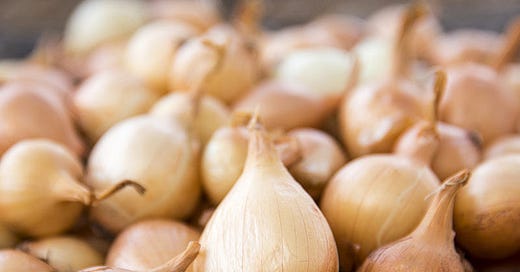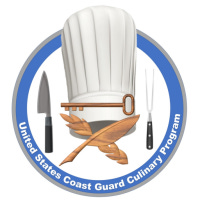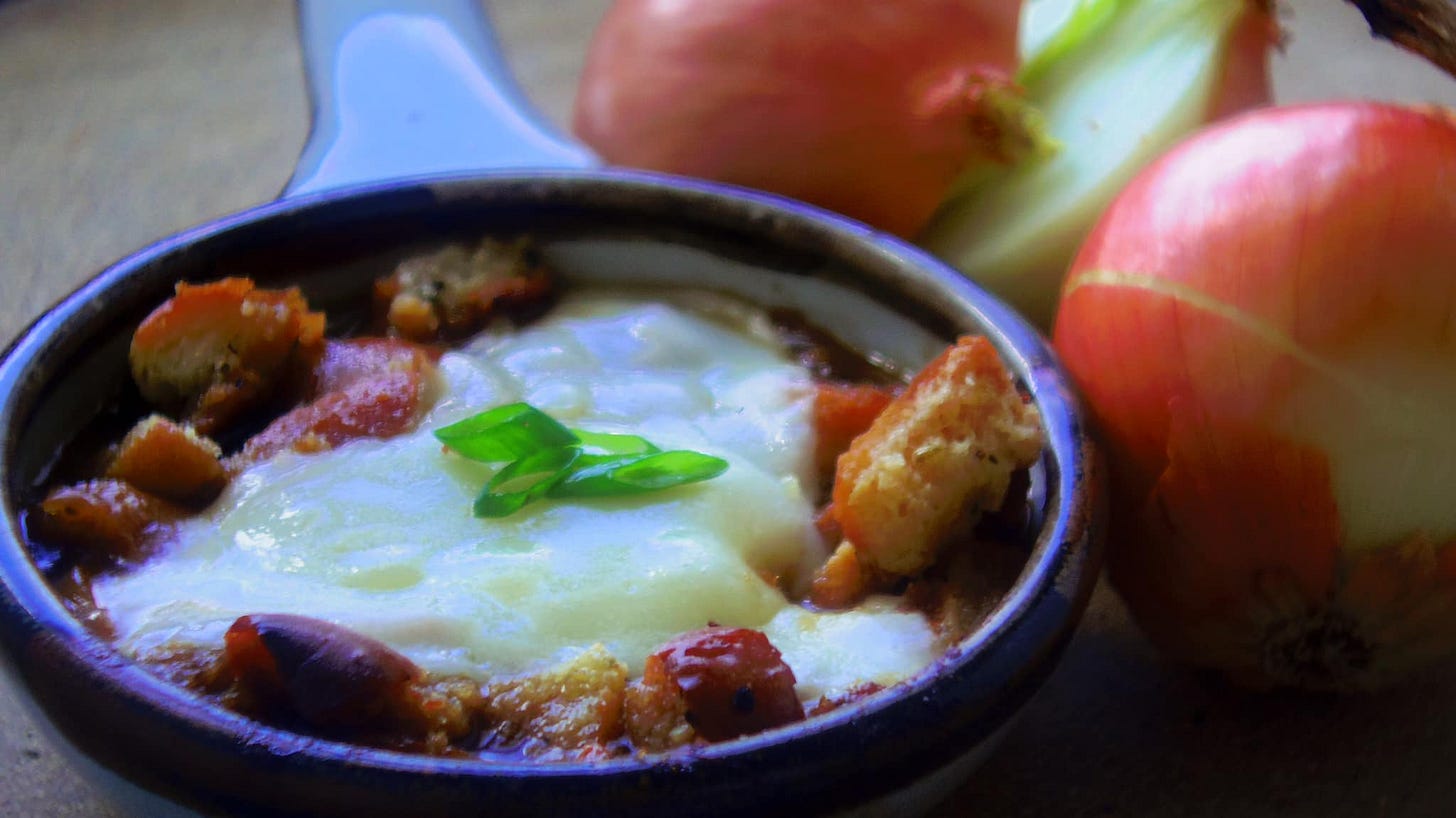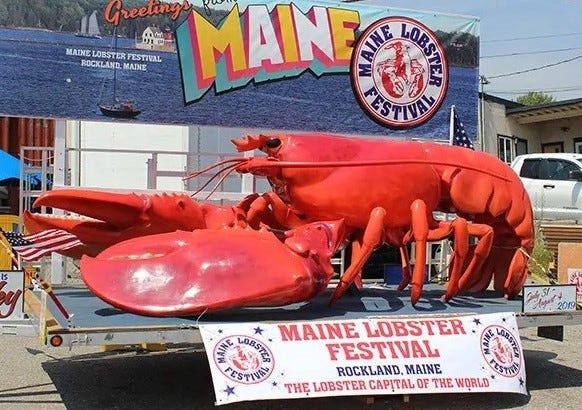In November of 1988, by way of San Fransisco, I reported to the Subsistence Specialist school at the US Coast Guard Training Center in Petaulma. The subsistence specialist school was a three month culinary training program, which was organized into three one month segments.
During our first month, our class first learned about proper food service safety and sanitation procedures. Not the most exciting start to the cooking program, but definitely very useful information that I use to this day. Then our class was thrown into an intensive two week session on culinary math and measurements, recipe conversions, etc.
During the second month, we worked every night with the bakers. Every every night at 9:00, and report to the mess hall. My class and I were immediately baptized into the life of professional baking. Starting off we were given assignments to make cookies, quick breads, muffins, etc. Then we progressed for the next couple of weeks learning to make yeast breads, danishes, cinnamon rolls and pies. I specifically remember one of the bakers who taught us how to make a basic sweet dough, then we would roll it out and then be shown all of the ways that we could shape a danish. I found this pretty amazing, but unfortunately I can count the number of times on one hand since that I have actually made danishes.
For the final month, our class scheduled to day hours where we continued to work in the mess hall, at various shifts preparing breakfast, lunch, and dinner. My first shift was on a Saturday morning at 6:00 am to help prepare breakfast. As I had shared in “My Unintended Edible Journey - #2”, https://chefstevenreed.substack.com/p/my-unintended-edible-journey-part-f19 I was already pretty competent at making breakfast and could prepare and sort of eggs, omelets, pancakes, or waffle without any difficulty. But as a natural night owl, I soon found out that coming into the kitchen to work at 6:00 am, and actually being alert do the work in the kitchen were two altogether different things.
On that first morning I was assigned to make the pancake batter. The recipe was for 50 people. Military recipes are based on serving 100 people, so I with my newly learned culinary math skills in my head, I halved the recipe. EVERYTHING in food preparation moves on a tight timeline. But as a culinary student, I still had to learn that lesson. for I was taking my sweet time bit to gather and measure out the required ingredients and start mixing my pancake together. My early morning lackadaisical approach to this assignment definitely did not impress my Filipino instructor who had a very short fuse and needed everything finished yesterday. Standing right beside me as I was getting ready to turn on the mixer, he yelled at me. ‘What’s the matter with you! Are you going to make the pancakes this morning? Or do I have to treat you like a child!?” He then started talking at me in his own Filipino tongue which I am sure included plenty of Filipino expletives. Not wanting to be the recipient of any more expletives in any language, I shaped up and found a faster and more attentive gear, finished my pancake batter, and made some beautiful pancake for breakfast that morning.
After a week of working the breakfast shift, our training schedule changed again to work in the kitchen to make lunch and dinner. Showing up for this shift at 10:00 am, I was handed my recipe for the day. I was assigned to make french onion soup for 100 people. I grabbed a clean cutting board, a chef’s knife, and a 20 pound bag of onions. Whether it was from the fumes of the onions or from the emotional turmoil of having to cut so many onions, I found myself bawling huge crocodile tears before I had finished cutting my first onion.
After about an hours time, I had cut every onion in that 20 pound bag and wiping the last tears away from my eyes, I proudly told my instructor that I was finished cutting the onions and was ready to make the french onion soup. Dumping the onions into a large steam kettle, I soon for the first time, witnessed what I consider on of the most amazing cooking processes in the culinary realm. That is the process of carmelizing the onions. For those of you who may not be aware of this process, when a person caramelizing onions means that the onions are cooked until they take on a beautiful caramel color of golden brown. It is sort of like intentionally burning the onions slightly. In caramelizing the the onions bitter taste of the onion is transformed with a much mellower almost sweet taste. When I deglazed the pot with some sherry cooking wine, I learned that all of those wonderful flavors that I had created in caramelizing the onions were now captured and were a big part of producing the wonderful flavor that defines French Onion Soup. I finished it by adding the beef broth and herbs. When I taste tested the soup and adjusted the seasonings, stepped back to see that I had made a pot of french onion soup to feed 100 people! Sure my hands smelled like onions for another 3 days, but I had discovered that I was more of a chef than I ever realized. Maybe my commanding officer on the “Rambler” was absolutely correct on in his instincts when he told me that I would make a really good cook, for I was starting to believe it.
While I thoroughly enjoyed being a culinary student in Petaluma, I realized that this was a three month training program and in three months time, I was going to be reporting to a new unit as their cook. Where that unit was going to be was a huge question. And I wouldn’t get the answer to that question until the end of my training. During the first week of our culinary training, we had to fill out a form that listed our first six choices of the units that we wished to be assigned to once our training was completed. Our instructors told us that the people responsible for choosing our next units after our graduation, would do everything possible to assign us to one of the units listed or a unit as close as possible. All of the Coast Guard units that I listed were either somewhere on the Great Lakes or the Mississippi River.
About a week before our graduation, we were told to report to a classroom to receive our next assignments. A few moments before our instructors came into the room with the official list, I can definitely feel the both the excitement and nervousness in the room. Was I going to be the cook on a buoy tender, or part of a Mississippi Patrol Unit? Or were the powers that be going to assign me to a Coast Guard Ice Breaker, one of which was scheduled to be heading for Antarctica in about a month.
As the instructor started reading off my classmates names and their next units, our collective mix of feelings of excitement and dread were definitely manifested. Some people in our class were going to places like Hawaii, Florida, or Southern California. Others were going to Coast Guard Cutters stationed in places like New York City, or New Orleans. There were a couple of people that were assigned to be cooks on the Coast Guard Icebreakers. Our assignments were given in alphabetical order, I had to wait a while to learn of my fate. Finally the instructor reached reading off my name.
Standing at the podium she said, “Steven Reed”, I raised my hand. “You have been given orders to report to be the cook at the small boat station in Rockland, Maine. That’s a really great assignment there Reed!”
“Rockland, Maine? Where in the world is Rockland, Maine?”, I asked.
At first I was sort of disappointed that my request to be stationed somewhere in the Midwest wasn’t granted, but then I was hearing the disappointment of people who were assigned to ships that were scheduled to be out at sea for nine months a year, and a couple of guys who did get assigned to that icebreaker heading to Antarctica.
I honestly didn’t know what I thought about being transferred to Rockland, Maine. Even though my instructor seemed to think that it was great, but other than the fact that great lobsters come from Maine, I knew next to nothing about it.
When our class was dismissed, I headed straight for the small library located on the base to gather more information. I went into the library’s reference section, and found an atlas. Turning to a page with a map a Maine, I found the location of Rockland, nestled on on the coastline about halfway between Portland and Bar Harbor on Highway 1 which runs along Maine’s coastline. I had found the spot on the map where I was going to spend the rest of my enlistment. And when it came down to it, it really didn’t matter what I thought about the decision, someone looked at all of my suggestions of letting me be stationed on the Great Lakes or the Mississippi River and instead decided that I should be the cook at the Coast Guard small boat station in Rockland, Maine. Sitting in the library, I continued to look at the dot representing Rockland, Maine and then the rest of the map. I really didn’t know about the state of Maine, but I was starting to get excited about the prospect and the realization that I was being given a firsthand experience live in Maine and experience everything that it had to offer.
____________________________________________________________________________French Onion Soup
3# yellow onions, sliced
½ stick butter
1 ½ Tbsp. olive oil
5-6 cups beef stock
½ cup Merlot wine
2 Tbsp. Garlic, minced
¼ tsp. Thyme
1-2 bay leaves
1 tsp. salt
¼ tsp. Pepper
2 cups croutons
8-10 slices Provolone Cheese
Directions: Heat the butter and olive oil over medium heat in a medium-sized pot, and add the sliced onions. Cook the onions stirring often until the onions are caramelized taking on a brownish color. Reduce the heat to low. Add about 2 cups of the beef broth and deglaze the residue with from the bottom of the pan. Add the rest of the beef broth. Add the Merlot, garlic, thyme, bay leaves, salt or pepper. Simmer the soup for another 30 minutes. Fill bowls with soup, and top each with croutons and a slice of Provolone cheese. Place bowls of soup on a baking sheet and broil in the oven for 3-5 minutes or until cheese is melted and serve immediately. Recipe serves 6-8 people.








